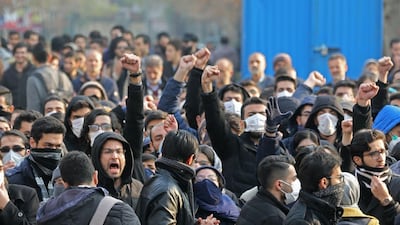Iran’s economy entered into recession for a second consecutive year, as crippling US sanctions took their toll on the economy, virtually wiping out Tehran’s ability to earn revenues from the sale of crude oil and condensates.
Although Iran is trying to reduce its reliance on oil exports by increasing taxes and cutting energy subsidies, it is battling annual inflation levels of up to 50 per cent, according to the Institute of International Finance.
US sanctions have jolted the Islamic republic’s fragile banking system, aggravating problems for financial institutions, which struggled even before the reintroduction of US sanctions. Iran is unable to conduct business in the US dollar and fear of being penalised by Washington has dissuaded countries and corporates from doing business with Tehran.
“Our estimates show that the Iranian economy has contracted by 4.6 per cent in fiscal year 2018-19 [ending March] as a result of the sanctions,” said Garbis Iradian, IIF's chief economist for the Middle East and North Africa. “We expect the contraction to deepen to 7.2 per cent in the current fiscal year, 2019-20.”
The IIF’s projections of a deeper economic contraction and consumer price inflation follow the International Monetary Fund’s estimates released last year. The Washington-based lender said inflation is set to surge to nearly 40 per cent or more as Tehran struggles to keep its economy afloat. It projected Iran’s economy, which contracted 3.9 per cent in 2018, and more than 9 per cent last year to shrink by 6 per cent in 2020.
Most of the economic contraction, the IIF said, is due to the sharp decline in volume of exports of crude oil and condensates, which dropped from a peak of 2.8 million barrels per day in May 2018 to less than 0.4 million bpd in recent months. Washington has a goal of reducing Iranian crude output to zero.
The fall in imports has only partly offset the “drastic decline” in exports and Iran’s current account balance has shifted to a small deficit for the first time since 1998. The country’s official reserves are likely to decline further to $73 billion (Dh267.9bn) by March 2020 – a $40bn loss in just two years.
“We also estimate a decline in nominal GDP of $97bn to $275bn in FY 2018-19,” Mr Iradian said.
The US, which unilaterally pulled out of the Iran nuclear deal, slapped Tehran with economic sanctions in May 2018, hitting the oil and gas sector hard. Proceeds from the sale of hydrocarbons is the biggest revenue earner for the country and US sanctions have denied Iran's government more than $10bn, US officials said last year. Foreign investments into Iran have also dried up, including disruption of major business deals with the European Union.
The unemployment rate has also increased to 17 per cent, with youth unemployment of around 30 per cent, one of the main drivers of protests against the regime. A rise in taxes and reduction of energy subsidies also added fuel to public fury that led to violent unrest in November 2019, which prompted a severe crackdown from Tehran.
While the protests ebbed for a few weeks, they resumed on January 11 after Iranian authorities admitted mistakenly shooting down a Ukrainian passenger aircraft carrying 176 passengers, which included 82 Iranians. The protests are demanding a wholesale change in leadership, as Tehran tries to grapple with the latest wave of civil unrest in the country.
European powers have also triggered the dispute process in the 2015 nuclear deal with Iran after Tehran announced it is breaching the enrichment limits.
France, the UK and Germany accused the Iranian regime of continuously violating “key” restrictions, which set clear limits on Iran’s efforts to develop its nuclear capabilities. In a joint statement on Tuesday the European powers said they had “no choice, given Iran’s actions” to refer the case to the dispute resolution mechanism.


